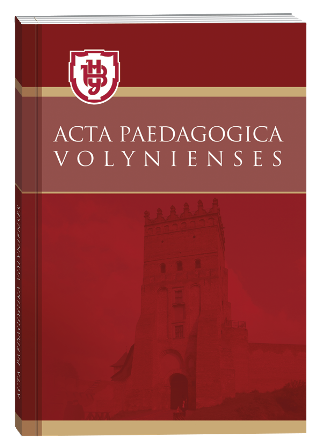USE OF LOGICAL AND MATHEMATICAL GAMES AS A MEANS OF DEVELOPING MATHEMATICAL ABILITIESSENIOR PRESCHOOLERS
DOI:
https://doi.org/10.32782/apv/2024.2.1Keywords:
preschool education, educational process, older preschool children, formation of elementary mathematical representations, logic and mathematical gamesAbstract
The article is devoted to the problem of developing an important component of the child's personality, to be exact, the mathematical skills. The relevance of the chosen aspect of the study is voted to the uniqueness of mathematics as a mean of forming not only the educational, but also the developmental and intellectual potential of the individual, which will be able to act in new socio-economic conditions. The importance of developing the child's mathematical abilities is aimed at new directions of modern education – STEM, STEAM, STREAM, aimed at educating future engineers and scientists in the field of natural sciences. The concept of mathematical abilities is generalized and the main components of the mathematical abilities of preschool children are mentioned as a main features. As a means of developing mathematical abilities, logical and mathematical games are chosen, as a practical form of understanding the surrounding reality, a means of acquiring mathematical knowledge, skills and skills. The article defines the specific purpose of the study, which is to try to show the importance, expediency and possibility of using logical and mathematical games of different types in the process of developing the mathematical abilities of older preschool children. The main ways in which mathematical games contribute to increasing the effectiveness of learning are highlighted, among them: motivation and interest, active participation, cooperation and social development, practical application of skills, development of creativity and imagination. Various techniques, methods and forms of game work with children have been determined in order to develop the mathematical abilities of preschoolers. Different types of logical-mathematical games are described, their examples are given. Organizational and pedagogical conditions for the use of logical and mathematical games as a means of developing mathematical abilities of older preschool children have been revealed. Their effectiveness has been tested in the process of conducting pedagogical experimental research.
References
Базовий компонент дошкільної освіти / авт. кол.: Байєр О. М., Безсонова О. К., Брежнєва О. Г., Гавриш Н. В. та ін. Сайт МОН. 38 с. URL: https://mon.gov.ua/storage/app/media/rizne/2021/12.01/Pro_novu_redaktsiyu%20Bazovoho%20komponenta%20doshkilnoyi%20osvity.pdf
Брежнєва О.Г. Механізми розуміння в технології математичного розвитку дітей дошкільного віку. Теоретико-методичні проблеми виховання дітей та учнівської молоді: збірник наукових праць Інституту проблем виховання НАПН України. 2015. Випуск 19. Т. 1. С. 81–90.
Ємчик О., Коменда Л. Розвиток математичних здібностей у дітей старшого дошкільного віку засобами сюжетно-рольових ігор. Acta Paedagogiсa Volynienses. 2022. № 1. С. 50–55.
Карук І. В. Експериментування як вид діяльності дітей у дошкільній педагогіці України (середина ХХ – початок ХХІ століття): дис. …д-ра філософії (PhD) за спеціальністю 011 Освітні, педагогічні науки. Вінниця, 2023. 286 с.
Концепція освіти дітей раннього та дошкільного віку / Національна академія педагогічних наук України. Київ : ФОП Ференець В.Б., 2020. 44 с.
Костюк Г. С. Навчально-виховний процес і психічний розвиток особистості. Київ: Радянська школа, 1989. 608 с.
Програма розвитку дитини дошкільного віку «Українське дошкілля» / О.І. Білан; за заг. ред. О.В. Низковської. Тернопіль : Мандрівець, 2023. 256 с.
Семенець C., Семенець Л. Зміст і структура математичних здібностей учнів. Математика в рідній школі. 2016. № 3. С. 33–36.
Скрипченко О.В., Падалка О.С., Скрипченко Л.О. Психолого-педагогічні основи навчання. Київ: Український центр духовної культури, 2003. 328 с.
Старченко В. Навчання математики: сучасний погляд. Дошкільне виховання. 2008. № 7. С. 19–21.







